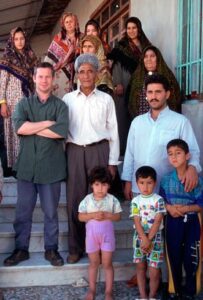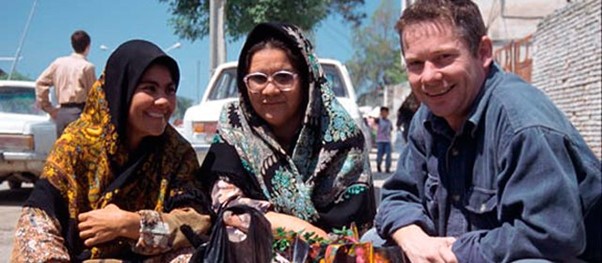Visiting the Middle East: Customs and Culture

Culture Facts
Religion: The major religion of North Africa and the Middle East is Islam and there are substantial numbers of Jews and Christians who also live in these countries. Racial and ethnic harmony varies from peaceful in Syria to contentious in Israel.
How to Dress: Modestly for men (i.e no shorts) and for women, a headscarf is an essential and absolutely no bare arms or bare legs.
Making Friends: A pack of cigarettes for adults and pens or hair accessories for children will make you popular.
Making Enemies: Egging on bartering shop keepers, ranting in English, taking unrequested photos of people, especially the Bedouin.
Travel Tip: Ditch those Western ways! Watch how the locals dress, greet each other and follow suit. Learn a few useful and polite phrases in Arabic and you’ll soon be making friends with the warmest and most welcoming people in the world.
Dress for Female Travelers
For travel in Middle Eastern countries, taking a lightweight headscarf is highly recommend for women. No matter what your personal feelings about this custom are, it saves you a lot of staring and unwanted attention from grinning teens to hassle from grown men. More importantly however, it’s more respectful of the culture.
When visiting a Mosque or a holy shrine, as a woman or a non-Muslim you are required to wear a headscarf, no exceptions, but you’ll win points if you put it on automatically for respect. The headscarf option may be of more use in the more rural areas as city women tend to dress far more “western”. This is true for cities such as Marrakech, Istanbul, Damascus, Beirut where the rules about head scarves are much more relaxed – however, ALL mosques require you to be respectful and cover yourselves before entering.
Don’t bring too many tank tops or short sleeved shirts or shorts, even in summer (Capri pants can be okay in the more moderate Arab states). Of course, it’s your preference, but if you want to travel as unobtrusively and respectfully as possible, dress modestly in these countries. Watch what the local women wear and your trip will go a bit smoother.
For single women travelling alone, it is suggested to bring a ring that looks like a wedding band, and possibly a picture of any man that you can refer proudly to as “my husband”. Wearing the pseudo wedding band means “hands off, no chance”. If you don’t have children and they ask “when?” or “why not?” and you don’t want to get into a lengthy discussion of whatever reason you have, just look slightly wistful and say “Inshallah.” which means “god willing (I’ll have children one day).” which gives you a friendly, graceful exit.
You can pretty much answer any question you don’t want to answer with “Inshallah!” It’s a great phrase – sort of like “we’ll see, sort of, I don’t know, maybe, probably not!”.
A Gift is a helping Hand
It’s helpful at times, to have a pack of cigarettes, even if you don’t smoke. If you want to buy something in a souk, you will be haggling about the price. If you offer a cigarette to the person selling the thing (if it’s a man 9 times out of 10 he’ll be a smoker), you start to become more like a friend than a customer, “Oh, we’re just sitting here, two friends, talking about something I like.”
Always handy is a good story to tell while haggling for the product you want – “it’s for my cousin who is getting married” for example. Arabs tend to “talk around the point”, while Americans and Europeans are more direct. Sometimes, offering a cigarette to a persistent male will give you time for a graceful exit. “Here, please have one. You know, I really have to be going now. Bye!”
Related and sometimes useful is a bag of small cheap plastic hair barrettes to hand out to little girls – comes in handy when you want to take pictures. OR small pieces of candy or cheap ballpoint pens. Warning, though, if there is a crowd of kids, they will descend on you – better to use this nicety if there are only one or two children present. Giving a gift to a stranger’s child will not have the same negative connotations as in the West.
Staying Safe on the Streets
There may be good reasons these days to avoid looking like you’re from America. To avoid being a target for pickpockets, walk confidently at all times, even if you’re totally lost and terrified, pretend you’re not. Scope out some place safe (bus terminal, gas station, porch of private home with kids) where you can check a map, ask a question or just get your bearings.
Observe the locals, cross the street when and where they do – cross with them in a group rather than alone. If people don’t look like they’re eating snacks or drinking coffee while walking in the street, you shouldn’t either. Stay away from crowds and never get involved in the local demonstrations. Steer clear of heavily guarded American embassies, except if you’re going in to register, and always steer clear of military-looking areas.
Taking Photographs
DO NOT TAKE PICTURES OF ANY WOMEN WITHOUT ASKING. If a women is wearing a headscarf or is Bedouin (recognisable by facial tattoos), better to not take her picture at all. Always ask permission first. Many Bedouins in Morocco believe taking a photo image of them steals their soul – it’s serious stuff in their culture. Bedouin men seem not to care and will usually pose handsomely, but ask anyway. Do not, under any circumstances, take pictures of obvious military or governmental staff, or heavily guarded buildings. You have been warned!
Make sure you keep any expensive cameras in cases and preferably out of view in a bag or rucksack, or at least carried towards your body rather than in view of wandering hands on the street. You may actually be surprised that street crime is much lower in the Middle East than the towns and cities back home (punishment and discipline is far stricter in all levels of society) but it always pays to look after your valuables carefully.
Dealing with Persistent Traders
To deal with persistent souvenir hawkers, it’s better not to tease them, harass them back or get angry. They’re just trying to make a living to feed themselves and their family. Don’t offer a lengthy explanation in your native language of why you don’t want the thing, simply say “No, thank you”, preferably in Arabic (“La, shokran”), firmly but strongly and walk away briskly.
Many souvenir hawkers seem to know many languages, but often they only known a few appropriate phrases or attention getting questions in that language, and that’s where their knowledge ends. If you try to say “no-I-know-you-made-it-yourself-it’s-very-nice-I-just-don’t-want-any-I-already-have-seen-that-crap-in-dozens-of-other-shops-I’m-not-buying-any.” in your rapid-fire speaking voice and alien accent, they might not understand, and it seems rude, as if you’re making fun of them. “No, thank you.” said firmly and clearly is better and will let them exit to find another victim.
A little politeness and a smattering of a few Arabic words will earn you dividends one hundred-fold when encountering the local people in any of the Arab lands.
More Information
The US Bureau of Consular Affairs
Travel advice, warnings and resources for all American travellers.
British Foreign and Commonwealth Office
Travel advice for British citizens including travel warnings.
Guide Written by Erika Linden Green-Rafeh




